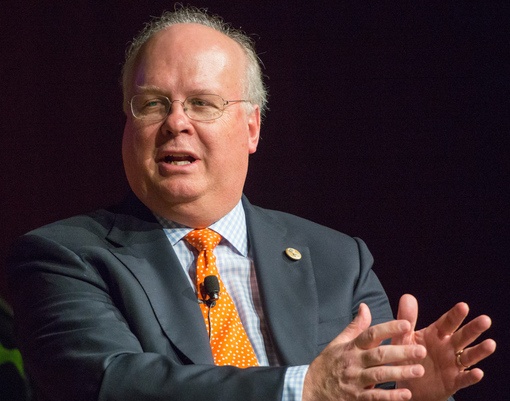
Photograph Source: Jay Godwin – Public Domain
Karl Rove was recently interviewed on Fox. Rove was Senior Advisor and Deputy Chief of Staff during the George W. Bush administration and now is a political analyst and contributor for Fox News and The Wall Street Journal. He is also one of the most astute political organizers for the right wing.
His strategies led to Bush’s 1994 and 1998 Texas gubernatorial victories, and his successful presidential campaigns in 2000 and 2004. He also helped win a number of other significant Republican Senate races. Despite his reactionary politics, it is necessary to acknowledge that he has some ability to win elections and listen to what he has to say about President Trump’s campaign tactics.
Rove pointed out that Trump is using his rallies, not just as media events to pump up the enthusiasm of his base. More importantly he is using them to build network of Republican foot soldiers to get out the vote, to win his reelection and keep Republican control of the US Senate.
Rove revealed the obvious, they are collecting names along with their email and postal addresses, to get back in touch with them to volunteer. They don’t even have to attend a rally. A ticket is required to attend these free events, but one must first secure one on-line. The events are often held in modest size arenas creating an urgency to obtain a free ticket to get inside to see the President of the United States.
The obvious question is, are the democrats applying a similar organizational effort? If so, it’s not apparent. A slew of presidential candidates have presented many thoughtful and detailed policy plans, but issues are not a substitute for organizing. The candidates’ emphasis on issues has contributed to their drifting into bickering over who has the purest record in supporting particular ones. Lost in the squabble is an attempt to work together to replace Trump with a candidate that would promote a more transparent, open and responsive government.
Consequently, a broader organizational strategy for the democratic party has been abandoned on the curbside as the candidates compete to head a parade to the next televised debate. Not one candidate has emerged as an organizer to help coordinate their individual campaign efforts to defeat Trump. Comparing Trump’s use of campaign events to how the democrats are using theirs reveals why such coordination is critically necessary if the democrats hope to secure a victory in 2020.
As of August 15th, Trump has held nine campaign rallies, with a total estimated attendance of around 76,000. This number was derived from news reports taken at the time of each event. The police or fire departments’ crowd size estimates were rarely reported. This number also did not come from either political party, as they would be biased. For instance, Trump tweeted that for his appearance at Orlando FL there were 74,000 ticket requests for the 20,000-seat arena, whereas their permit was only for 17,000.
As president, Trump obviously attracts larger crowds than any single democratic candidate. It is likely that his total attendance far exceeds the combined total for all of the democratic candidates’ rallies. Keeping an eye on the electoral votes, he has prioritized staging rallies in the swing states of Michigan, Pennsylvania and Wisconsin, and in Florida, Texas and North Carolina, to repeat his victories there.
The top three democratic candidates websites show that their attention is on collecting volunteers for phone banking, canvassing, and attending neighborhood gatherings. These are all necessary tasks, but they rely on voters focused on a single candidate.
The Democratic National Committee could play an important role by encouraging all of the democratic candidates to agree to share their lists with whomever is chosen as the democratic nominee. Otherwise, the nominee will be facing a formidable task of catch up, if the Trump campaign is collecting data from 76,000 attendees as potential volunteers. This effort could represent a stealth effort that has gone unnoticed and cannot be discounted.
A democratic candidate could also step forward now to support building a national database that combines the supporters of all of the candidates. This list could be under the supervision of the DNC to inform all the people on the list when a democratic candidate will be in their region speaking and to organize those in states where there is a contested US Senate race to get out and vote.
Collecting names and building a grassroots organization is critical to registering voters and hence winning elections. Republicans appear to be well down that road, whether it is due to the efforts of the Trump campaign or the Republican Party.
Governing magazine ran an article by Alan Greenblatt shows that more people are registering as Republicans than Democrats in the 2020 battleground states of Florida and Pennsylvania, where Trump has already held rallies this year. In the last two presidential races Florida was decided by a one percent margin. And Pennsylvania was another razor-thin Trump victory.
For the democrats to win the next presidential election and have a hope of flipping the Senate, they must start organizing the immense network of supporters that the current list of presidential contenders has created. The party must push them to think strategically as a coherent group, even as they compete against each other to win the nomination.
If they ignore the task of organizing and continue to focus just on the issues, they will be assuming that in the general election people will vote for the democratic nominee because that person will present the most reasonable and progressive platform for the nation. That’s a logical assumption, but then again, they should remember what happened to Hillary Clinton against Donald Trump.